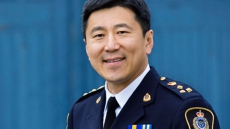TORONTO — In the wake of the Supreme Court of Canada's historic ruling that struck down the ban on physician-assisted death, health professionals are grappling with a host of thorny ethical and practical issues raised by the decision.
Here are some of the questions being asked by and of key medical organizations and the answers they are so far able to provide:
Q: What do doctors now tell suffering patients who ask them for help to die?
A: The Canadian Medical Association (CMA) is advising its 80,000 members that the law prohibiting medically assisted death is in effect for a year, giving government time to revamp the legislation.
"So nothing changes over the next year while the details are being sorted out," said CMA president Dr. Chris Simpson.
Q: How many doctors would be involved in deciding whether a patient meets the criteria for physician-aided death?
A: Simpson said the 12-month period gives physician groups and legislators the opportunity to study how medically assisted death is performed in other jurisdictions where the act has been legalized, such as the Netherlands, Switzerland and a handful of U.S. states.
"In general, we want the process to be pretty extraordinarily robust and careful with a lot of steps," said Simpson, including safeguards to protect the vulnerable and to ensure the person seeking to end their life isn't being influenced or coerced by others, even subtly."
"So I would envision multiple steps with more than one doctor, maybe even a panel or some sort of a board that evaluates all of the complexities of this. Because ultimately, at the individual patient level ... it's not an emergency that needs to be done right away. There's time for a process to be thoughtful and ensure that only the people who truly should have medical aid in dying get it."
Q: What about a patient who is physically incapable of giving themselves a fatal drug dose — because of quadriplegia or advanced ALS, for instance?
A: Simpson calls this one of the "important nitty-gritty details" yet to be worked out. It's a question that needs to be explored by doctors groups, legislators and legal experts as a framework for how medical aid in dying will actually be delivered.
"A lot of doctors regard the prescribing of a lethal substance as the moral equivalent to actually administering a lethal substance," he said. And while hooking up an IV and giving a fatal dose could be done by any trained physician, "many doctors are saying there should be another class of clinicians who does only this."
"I'm not sure that really absolves anybody because the hard work is in the decision-making. The hard work is not in hooking up the IV."
Q: The Supreme Court ruling says Canadians who are enduring intolerable physical or mental suffering have the right to seek medical help to end their lives. But what constitutes mental suffering and where would the line be drawn?
A: Padraic Carr, president of the Canadian Psychiatric Association (CPA), said that's one area of the judgment, in particular, that needs further legal clarification.
"Every patient is different and it's unclear who would meet that legal test or what they define as intolerable, enduring suffering," he said of the nine justices' unanimous decision.
Carr said their ruling speaks to four points in which physician-assisted death may be considered: where a patient is competent; clearly consents; has what they define as a grievous and irremediable condition; and has enduring intolerable suffering.
"I think it would be very difficult for a patient who has a severe mental illness to meet these four criteria."
Q: People with clinical depression and certain other psychiatric disorders are often suicidal. How would doctors tease out whether a patient's desire to die is a result of their illness and might be alleviated with treatment?
A: Carr said the court ruled that a patient must be "competent" to obtain medically assisted death, a term which psychiatrists call the "capacity to make decisions."
Capacity means a patient must: be able to make a choice; have the ability to understand the relevant information around that choice; must appreciate their situation and the consequence of making the choice; and demonstrate that they can manipulate that information rationally, he said.
"So depression and other psychiatric illnesses, including psychotic disorders, can certainly influence your insight and judgment and they can also affect that ability to appreciate your situation and to manipulate that information rationally. So all of those would be included in any capacity assessment."
While the 4,700-member CPA has no official position on the court's ruling as yet, Carr said he can't imagine a scenario in which a patient would meet all those criteria and their situation be thought hopeless.
"It would be a rare instance in psychiatry where a condition would be considered irremediable. Even when someone is called clinically resistant, there are still other treatments that may work."





